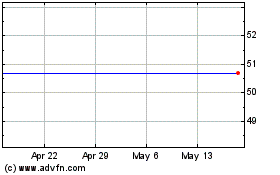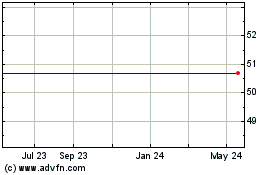Verizon Communications Inc.'s pursuit of Yahoo Inc. received a
boost as several prominent suitors opted not to make offers for the
beleaguered Internet company.
Ahead of a Monday deadline for preliminary bids, the telecom
giant was among a handful of firms moving ahead with offers to buy
Yahoo or parts of it, compared with the roughly 40 firms that had
initially expressed interest, people familiar with the process
said.
One interested suitor that won't be participating is Time Inc.,
which concluded the degree of difficulty in righting Yahoo's
fortunes is too great, according to a person familiar with the
situation.
Others that have opted not to make a bid include Google parent
Alphabet Inc., Comcast Corp., AT&T Inc. and Barry Diller's
IAC/InterActiveCorp, according to people familiar with the
matter.
Verizon, with a market cap of roughly $210 billion and about
$4.5 billion in cash on its balance sheet, has the means to
purchase Yahoo's declining Web assets and a logical blueprint for
folding them into its fledgling digital media business, which
includes the AOL properties it acquired last year for $4.4
billion.
Verizon hopes video services and online advertising will be its
next growth engine. It plans to combine customer data from
smartphones with advertising inventory on AOL—and possibly Yahoo—to
create an online advertising technology platform that can compete
with Web giants such as Facebook Inc. and Alphabet's Google,
analysts say.
"Verizon is trying to pivot its business from analog to
digital," said Craig Moffett, senior analyst at MoffettNathanson, a
telecommunications-research firm. "Verizon believes that a combined
AOL/Yahoo would provide the digital advertising platform they need
to execute their video reinvention strategy."
Underscoring the strength of Verizon's position, it now appears
that its primary competition in the auction might come from
private-equity firms. Among the buyout firms interested in bidding
are Bain Capital, TPG and Advent International, according to the
people familiar with the process.
At least one other private-equity firm, KKR & Co., has
expressed interest, though it wasn't clear whether it would place a
bid Monday. Britain's Daily Mail & General Trust was still in
talks with private-equity firms to become partners on a bid, a
person familiar with the matter said.
Yahoo's core business could attract between $4 billion and $8
billion in an auction, people familiar with the process have said,
but given the recent travails of the business and other
complications it is far from clear what the assets might fetch.
A strategic buyer such as Verizon typically can afford to offer
more of a premium for the asset than a private-equity buyer, which
would be constrained by a valuation based on potential profits. As
of Friday, Verizon was still working to determine its opening bid
for Yahoo, according to a person familiar with the matter.
"It's not likely to be a cheap acquisition" for Verizon, said
Jan Dawson, an independent technology analyst. "But this
acquisition fits well strategically and wouldn't necessarily break
the bank."
The carrier is working to restore its credit rating to what it
was before spending $130 billion in 2014 to buy out Vodafone Group
PLC's minority stake in Verizon Wireless, so the carrier isn't
willing to overpay for Yahoo, two people said.
A Yahoo deal carries potential risks that could scare off
bidders. The Web business is a shrinking asset, expected to post
sharp declines in revenue and profit this year. Potential buyers
have expressed frustration that Yahoo's managers have failed to
answer detailed questions about its business prospects, according
to the people familiar with the process.
A spokesman for Yahoo declined to comment.
A proxy battle with activist investor Starboard Value LP at the
company's shareholder meeting this summer could also sweep out
Yahoo's board of directors and cast uncertainty around any talks
with an acquirer.
Yahoo will face pressure to address these risks when it reports
first-quarter results on Tuesday. Analysts on average expect Yahoo
to post earnings of seven cents a share, according to Thomson
Reuters. A year earlier, Yahoo earned 18 cents a share. Analysts
expect revenue of $1.08 billion, down 12% from a year earlier.
Potential bidders have been asked to specify what assets they
hope to acquire and a price range they expect to pay. Some buyers
might be only interested in Yahoo's core Web business, or pieces of
it, while others might also propose bids for the company's stakes
in Alibaba Group Holding Ltd. or Yahoo Japan.
Verizon's pursuit of Yahoo illustrates the degree to which the
former Baby Bell is seeking to transform itself. The company is in
the midst of a labor dispute with workers at its legacy business.
Two unions representing nearly 40,000 landline employees began a
strike last Wednesday after 10 months of contract negotiations.
Landlines have been in decline for years, and Verizon is pulling
back on its wired broadband business, having just closed on the
sale of assets in California, Texas and Florida. It is focusing
nearly all its energy on its wireless business, which accounted for
70% of its 2015 annual revenue.
But its wireless business is maturing, too. Verizon Wireless is
the nation's largest carrier by subscribers, with roughly 112
million. Most of those customers have already upgraded to more
expensive smartphones, meaning Verizon is increasingly fighting off
rivals by lowering prices. It has warned earnings will plateau in
2016 as it transitions the business.
Jeffrey A. Trachtenberg, Lukas I. Alpert and Dana Mattioli
contributed to this article.
Write to Douglas MacMillan at douglas.macmillan@wsj.com and Ryan
Knutson at ryan.knutson@wsj.com
(END) Dow Jones Newswires
April 17, 2016 21:25 ET (01:25 GMT)
Copyright (c) 2016 Dow Jones & Company, Inc.
Iac/Interactivecorp (NASDAQ:IACI)
Historical Stock Chart
From Dec 2024 to Jan 2025

Iac/Interactivecorp (NASDAQ:IACI)
Historical Stock Chart
From Jan 2024 to Jan 2025
